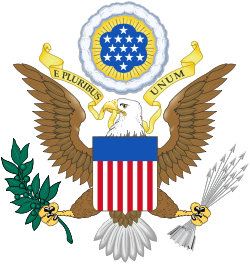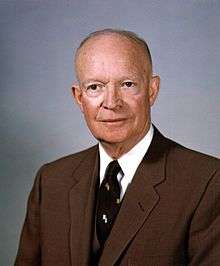Eisenhower Doctrine
| This article is part of a series on the |
| Politics of the United States of America |
|---|
 |
|
Legislature
|
| ||
|---|---|---|
President of the United States First Term Second Term Post-Presidency |
||
The term Eisenhower Doctrine refers to a speech by President Dwight David Eisenhower on 5 January 1957, within a "Special Message to the Congress on the Situation in the Middle East." Under the Eisenhower Doctrine, a Middle Eastern country could request American economic assistance or aid from U.S. military forces if it was being threatened by armed aggression from another state.[1] Eisenhower singled out the Soviet threat in his doctrine by authorizing the commitment of U.S. forces "to secure and protect the territorial integrity and political independence of such nations, requesting such aid against overt armed aggression from any nation controlled by international communism."[2]
Background
In the global political context, the Doctrine was made in response to the possibility of a generalized war, threatened as a result of the latent threat of the Soviet Union becoming involved in Egypt after the Suez Crisis. Coupled with the power vacuum left by the decline of British and French power in the region after the U.S. protested against the conduct of their allies during the Suez War, Eisenhower felt that a strong position needed to better the situation was further complicated by the positions taken by Egypt's Gamal Abdel Nasser, who was rapidly building a power base and using it to play the Soviets and Americans against each other, taking a position of "positive neutrality" and accepting aid from the Soviets.
On the regional level, the intent was that the Doctrine would help to provide the independent Arab regimes with an alternative to Nasser's political control, strengthening them while isolating Communist influence through isolation of Nasser. The Doctrine largely failed on that front, with Nasser's power quickly rising by 1959 to the point where he could shape the leadership outcomes in neighboring Arab countries, including Iraq and Saudi Arabia; in the meantime, Nasser's relationship with the Soviet leaders deteriorated, allowing the U.S. to switch to a policy of accommodation.
The Eisenhower Administration also saw the Middle East as being influential for future foreign policy not only regarding the United States, but also its allies. The region contains a large percentage of the world's oil supply, and it was perceived that if it were to fall to communism, the United States and its allies would suffer immense economic consequences. Eisenhower's protests against longtime allies — the United Kingdom and France — during the Suez Canal Crisis meant that the U.S. was the lone Western power in the Middle East and placed U.S. oil security in jeopardy as the USSR filled the power vacuum. The Eisenhower Doctrine was a backflip against the previous policy, however — the U.S. now had the burden of military action in the Middle East to itself.
The military action provisions of the Doctrine were applied in the Lebanon Crisis the following year, when the United States intervened in response to a request by that country's then President Camille Chamoun.
See also
References
- ↑ Buescher, John. "The U.S. and Egypt in the 1950s", Teachinghistory.org, accessed August 20, 2011.
- ↑ "The Eisenhower Doctrine, 1957"; see http://history.state.gov/milestones/1953-1960/eisenhower-doctrine
External links
Further reading
- Meiertöns, Heiko (2010): The Doctrines of US Security Policy - An Evaluation under International Law, Cambridge University Press, ISBN 978-0-521-76648-7.

.svg.png)